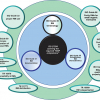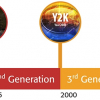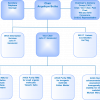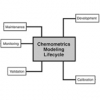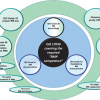Peter J. Jenks
the Jenks Partnership, Newhaven House, Junction Road, Alderbury, Salisbury, Wiltshire SP5 3AZ, UK
In recent months I have been looking at the websites of many of the big names, not only suppliers but also standard setting organisations and other professional associations concerned with my world of analytical chemistry. I wanted to see how the web was used and what they are saying about standards, calibration and laboratory accreditation.
I wasn’t doing this because I have a desperate wish to spend hours on the web, but because my curiosity had been triggered by a discussion with the CEO of one of my consulting clients. In essence he said “should we be doing more to use the web and social networking to promote the Company?” This set me thinking: a good topic for the Quality Matters Colum, I thought and Mr Editor Ian agreed.
A good place to start is the beginning: the “World Wide Web” is now so familiar that it is difficult to believe that it was only 21 years since the first file with the now familiar http:// prefix was placed on a server. That server and the file has long gone, but there is a copy available on the W3C website, here: http://www.w3.org/History/19921103-hypertext/hypertext/WWW/TheProject.html
The www.w3.org website is fascinating; everything you might want to know, but probably don’t need to know, about the history of the web is there.
Back in the early 1990s the web was textual, great for science but not much “fun”. But within three or four years an industry started which pulled Dr Tim Berners-Lee’s brilliant concept out of the academic arena and started an inexorable journey into the everyday world of most people in the developed, and an increasing number in the developing, world.
Back in the early 1990s I was an early Compuserve member in Germany and had a totally unmemorable e-mail address that was a string of numbers, something like [email protected]. I connected to the “web” using a dial up 56k modem (you were lucky to miss out on 14.4k or worse!—Ed.) and it seemed fantastic. But back then there were, in reality, few websites. The internet was for me about e-mail communication, until I loaded Netscape’s Navigator into my new laptop that had Microsoft’s new Windows 95 installed.
Fast forward to 2011 and I’m sitting here using a PC of seemingly amazing power with an internet connection that, on a good day allows me close to 8 Mb. With Mozilla’s Firefox 3.6, which has in its DNA my old friend Netscape’s Navigator, I can search the web quickly and thanks to a robust antivirus program and a sophisticated network with its firewall I can do so with reasonable confidence.
I started my research by preparing a list of key words, the names or acronyms for things and organisations that are day to day currency in an ISO 17025 accredited analytical chemistry laboratory. I chose the following 12: CRM; Certified Reference Material; Reference Material; Standard; Calibration Standard; ISO 17025; Accreditation; ILAC; International Standards Organisation; ISO; IUPAC; BIPM.
I also listed some publishers that I know specialise in science and the larger companies supplying consumables including Sigma Aldrich, VWR, Thermo and LGC Standards.
I then did some research to see which search engines might be the best to use, other than my default choice Google. To my surprise I found only eight English language search engines that seemed to offer a general search capability. I looked at more specific search engines that worked only in the scientific area: there are plenty, but many are very focussed and a significant number are not free. There seems to be a dearth of general scientific search engines.
So I returned to Google, Google Scholar, Bing and Yahoo. I also used Wikipedia. What did I find? I’m not going to go through the detail, but in general I discovered that the Web doesn’t help much if you don’t know where to look and what you are trying to find. Searching can be very frustrating, as the following examples show.
CRM: most results are for software called “Customer Relationship Management”. On 5 February a Google search for CRM didn’t have a single hit in the first five pages that was other than “Customer Relationship Management”.
Certified Reference Materials: much better, with all the hits relevant and an article in Wikipedia at the top of the list. The article wasn’t very good: dominated by links to commercial suppliers, some of which were not actually accredited producers of CRMs.
ISO 17025: a mixed result with some useful links, but most to organisations trying to sell me a service related to the achievement of an ISO 17025 accreditation or a book or training course that would make my life better.
ILAC: Good results and the ILAC website is informative. But a lot of links to totally unrelated sites.
So I thought it would be worth using a more complex search string that included a number of key words. I used “CRM standard water analysis”. This gave a much better result: all the hits were relevant and linked me to sources of both product and scientific information.
Next I tried Wikipedia: it looks as though a serious effort to build a comprehensive section on metrology a few years ago had faded out through lack of support. I found some good pages, some bad and some that had been hijacked by commercial vendors. But nothing really useful.
Not having had much luck with “Wiki”, I visited the websites of some of the suppliers identified by my last search and was fascinated by their links to Facebook and Twitter. But reading these pages it seemed that Facebook is used as a clever means of disseminating press releases. Twitter showed promise, there were questions and answers, though a bit superficial.
So, what does the web offer to help a scientist trying to discover more about chemical metrology? Are there specialist web resources, active web forums where specialists freely offer advice and questions? To be honest, I found very little that was of any use. In the context of chemical metrology the web is good if you know what you are looking for and choose the correct words to use to build a search string. If you are looking for good solid information about products, apart from the expensively and professionally produced pages that are owned by the big suppliers, there is almost nothing.
Why is that in other complex, technical professional areas there is a strong sense of community, where people with knowledge and experience offer help and advice, yet in the chemistry sector there is precious little? Two examples serve to highlight the dearth of help available to the neophyte analytical chemist. First, let us look at the computing (and especially web development) world. There is masses of “community” help. Obviously, the people offering free help are not far from their day job. So providing free advice helps to promote oneself as an expert and so can be seen as marketing to help attract work. But the way advice is offered goes way beyond what may be seen as cynical marketing. The people are enthusiasts and actually want to share knowledge. Next let us take a very different example, motorcycle riders. There are many, many web forums, lots of bloggers and no shortage of competent, professional advice. Many giving advice work in the industry: about six years ago the CEO of Triumph Motorcycles’ North American operation was an active participant in a forum dedicated to a particular new model.
But in the analytical chemistry world why don’t we see any parallels? Why don’t “communities” thrive in the scientific world? With a few exceptions, attempts to build scientific virtual communities have failed due to lack of support or interest. I know of a number of organisations in the analytical chemistry world that have traditionally depended on volunteers and are now struggling to continue. The popular wisdom is that employers are not willing to support involvement in non-profit-making “extra curricula” activities. I am not convinced.
It seems to me that the difference is enthusiasm: I see very few enthusiasts and those that exist are often derided by their professional peers. Why? Both computing and motorcycle engineering utilise very sophisticated technology: one is a new industry, one is over 100 years old.
Perhaps the problem is that the analytical chemistry society is mature and fossilised. Could it be that the professional bodies that once were the life blood of the community have become, like Government, institutionalised and stifling of enterprise and innovation? Or is it that they have simply lost touch with their members and have become large, successful businesses interested in their own continued existence? Certainly, some might be considered successful publishing houses with a peripheral interest in their members.
I really don’t know how to cause change and would welcome your ideas: certainly the status quo is untenable and I feel change is needed. Please use the commenting facility for this column article on the Spectroscopy Europe website and let me know what you think. I and many others want to hear your views: how can we rebuild a community of chemists? Perhaps with your input we can start to ask questions and demand answers from those who seek to represent us.


